SSO#9: Screening and Dancing at Goldsmiths
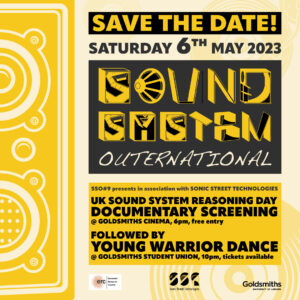
SST media partners Astarbene flyer
Once again SST was proud to support a successful Sound System Outernational gathering, the SSO#9 premiere screening of UK Generation 2 Generation research documentary. This was based on the SSO#8 event, UK Sound System Reasoning Session, which took place at Goldsmiths in November 2022. That full day brought together different generations of British-based sound system practitioners to discuss the present state of the culture in the UK. SST edited this down to a 45-minute documentary.
The screening started off with SSO team member June Reid’s most fitting tribute to the late sound system legend Jah Shaka, whose sound system was also local to Lewisham. Then SST team member Dr Natalie Hyacinth introduced the film as this and the SSO#8 event in November were her babies. So was the Sounds in Lewisham brochure based on her local research project, copies of which were distributed in the cinema.
Goldsmiths’ cinema was near full house with local sound system professionals from Lewisham, as well as Coventry’s Sisters in Dub and one international attendee: Milton Westcarr from Adelaide, Australia. Sounds system supporters and as well as many of the film’s participants and the film crew were in attendance. Reactions to the film were overwhelmingly positive we are pleased to say.
Discussion afterwards, expertly chaired by Yassmin Foster, was lively and friendly. Compared to SSO #8 it was noticeable how the atmosphere in the room was even more relaxed and trusting. This was not just between the participants and SSO as a university located research project, but also between the sound system professionals and each other. Also, between SSO#8 and #9 Goldsmiths reputation as a welcoming place for the local community had been greatly enhanced by its hosting of the massively attended “historic” event of Jah Shaka’s Nine Night.
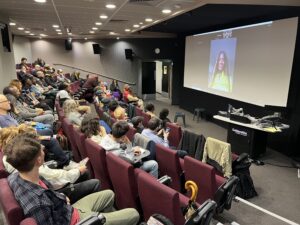
Dr Natalie Hyacinth introduces the screening
One of the most urgent issues the film recorded on the day was that of intergenerational transmission of the culture, in its ephemeral as well as material aspects. This vital topic led to quite an in-depth discussion the value of the archive and archiving. Professor Lez Henry raised an important point on the difference between archiving and documenting the culture – whereby recorded material can actually be experienced to some extent. Veteran soundwoman Sista Culcha provoked her peers to think about how their prized record collections are going to be enjoyed once they’ve passed on. Overall, sound system professionals were very much aware of the importance for their own knowledge as well as music collection or sound system gear, not to be dissolved or lost.
Bringing the screening discussion to a close, Siufan Audey gave a brief account of the SST YouTube channel archiving project she designed. (The archive is available at this link. See also Siufan’s own blog on the ongoing archive process and methodology). The first tranche of video material available is from the SST case study interviews in Huddersfield, to be followed with those from Lewisham and Jamaica. Our channel is also where you’ll shortly be able to find the final version of the film premiered on the night.
Discussions continued, of course, at drinks reception afterwards. There attendees were asked to fill in a questionnaire about the event as a contribution to sound system culture. Given our commitment to non-extractive research methods we were very pleased how readily and seriously participants took to this task, facilitated to no small degree by the gentle insistence from SSO team member Tanya Joseph. We took this willingness to participate in the research process as a sign of their appreciation of its value for the community.
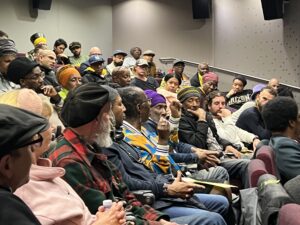
Discussion in the cinema
We were pleasantly surprised to find how positive the response to the film and our work was. Completed by 49 of the attendees, a majority identified themselves as “part of the sound system community.” There was a unanimous yes to the question “Have SSO events increased your awareness about the issues and potentials of UK sound system culture?” Nearly everyone also agreed that these events had “helped you to think differently about sound system culture; connected you with a larger community of sound system practitioners and researchers; increased your awareness about the issues and potentials of UK sound system culture?” This was very encouraging.
About the film itself, the question was: to what extent did it present some of the important issues for the UK sound system community today? Respondents had to answer this on a scale of 5 “a lot,” 4 “quite a lot,” 3 “somewhat” with the grades “not much” and “not at all” unused by anyone. To this question about the film 38 of the 49 answered a lot or quite a lot. Some of the comments volunteered were:
Well done it should be shown in community halls.
More young people, take it to the schools…
Very important information… we need more documentaries like this… You learn things that you never knew existed…
On the issue of archiving that came up in the film and the discussion, some comments were:
We are badly in need of a hall of fame, library and museum so that the people who don’t know this history of valve amps, acetates (aka dub plates) and who started the sound systems in the UK…
I want to hear more about the engineers, the music as a conduit to romantic love... so much more to celebrate and tell people about.
This last comment is particularly encouraging for the SST research project as the sound system technology is at its heart.
The second question: How important is it for the sound system community for there to be conversations between generations? To which all but 3 of the 49 answered “a lot” or “quite a lot.” Many of the comments showed a very sensitive understanding of the issues at stake for the sound system community, but perhaps our favourite is the first one here:
My parents dragged me out of a dance. I dragged my son into a dance.
Others included:
Very informative – especially about the importance of venues, intergenerational dialogue, creating safe spaces and struggle against racism.
Very good for younger generations.
The final question: how important is it for the university to support sound system culture through events such as this? Here all but 2 of the 49 answered “a lot” or “quite a lot.” Some comments:
Families can’t do what universities and educational institutions have a duty to do.
First communal space and conversation for this discussion. Congrats.
I wish there was more institutions doing something similar.
Would like to see more gatherings dealing with the issues.
The benefit is both ways. Universities can also benefit from showing support.
Creating knowledge and community spaces like this invaluable.
Amazing please get more funding. I would like to see projects that include secondary schools, maybe a school sound clash.
Sound system culture has made a tremendous impact on the popular culture for more than seventy years. The academy needs to acknowledge and celebrate this more.
It is quite important for SST, as a university European Reseach Council funded research project, to be able to show the value of our work for the sound system community we are researching. Whatever issues universities themselves are facing, we can and should make positive use of our “cultural capital” – particularly to benefit under-valued popular cultures.
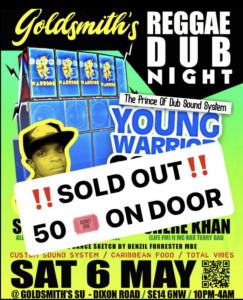
Young Warrior dance sells out
SSO#9 partnered with the Young Warrior dance in Goldsmiths Student Union next door to the cinema. The dance was a sell-out. After excellent sets from the Coventry-based Sisters and Dub and Shere Kahn feat. MC Terry Gad, Young Warrior took the decks at 1am for a three-hour set. He opened with a long and moving tribute to his father Jah Shaka who passed away just few weeks ago. Since this sad event Shaka has been remembered by sound system professionals, recording artists and fans all over the world through social media posts, podcasts, tribute dances and so on.
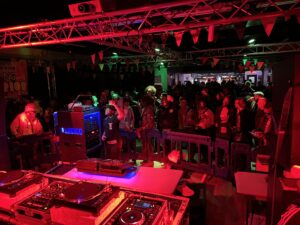
Goldsmiths Students Union on the night
Young Warrior kicked off by playing several anthem tunes voiced by Shaka such as Revelation 18 and If Jah is for I and I, as well as classic Shaka productions with different vocalists such Delroy Washington and Johnny Clarke. The night was feeling almost like a passing the baton from father to son, with Young Warrior giving his back to the crowd while dropping some classic Shaka selections from back in the days such as the raw dubplate mix of Play Fool Fi Get Wise. Young Warrior played all with copious siren and bass-only moments, before moving on to his own productions. The crowd, including several Shaka Ites and family members in attendance, responded very well and the emotion in the room was as tangible as the thunderous bassline.
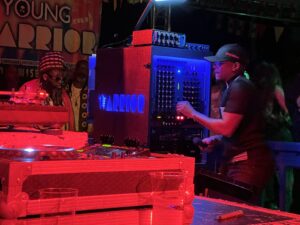
Young Warrior at the controls
Another unique feature of the dance was the artist Denzil Forrester at his sketching table soaking up the vibes to translate into charcoal on paper. A big fan of Jah Shaka from back in the day, Forrester has recently been sketching in Jamaican dancehalls, but this was a first with Jah Shaka’s son Young Warrior, whose music, Forrester said, was more to his taste than the dancehall he heard in Jamaica. So, Young Warrior was not the only person to attract fans, besides members of Forrester’s family, a couple of attendees said they knew the artist’s work and had come specially to see him.
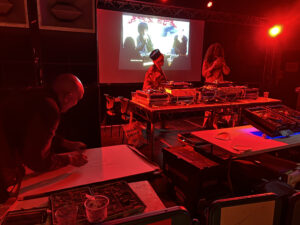
Forrester sketching Sisters in Dub
The evening and the night question led to several participants asking what comes next? Hopefully, the contribution that SSO has been able to make over nearly ten years and most recently with SSO#8 and this event will encourage the next moves from within the sound system scene itself.
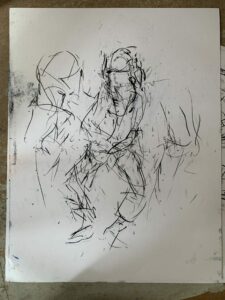
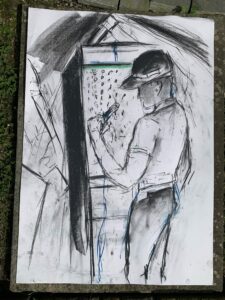
Two of the many sketches Forrester made on the night
